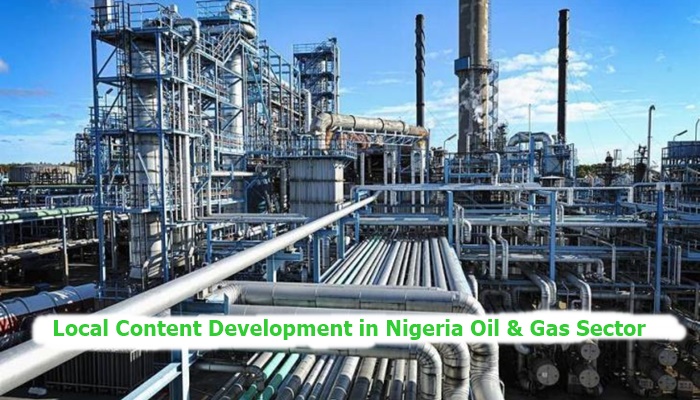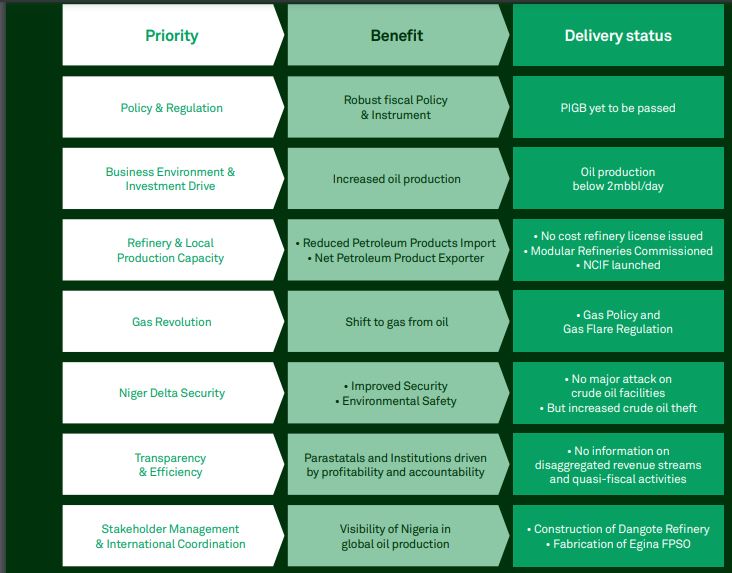
In this post, we x-rayed Local content development in the Nigerian oil and gas industry, the objectives and some of the achievements in the Nigerian oil and gas industry since 2010. The history of Local content development in the Nigerian oil and gas industry, what lead to the Local Content Act and more.
Local Content is a means used in many countries to protect and develop indigenous employees, products and services from foreign experts. The definition is specific to each country and depends on its micro and macro-economic conditions.
Local Content in Nigeria Oil & Gas Sector gives a framework for the increase in Nigerian participation in the Oil and Gas Industry / sector. It prescribes minimum thresholds for Nigerian participation in activities within the industry through the utilization of Nigerian human and material resources and services in the industry. It’s activities, connection with the exploration, development, exploitation, transportation and sale of Nigerian crude oil and gas resources.
Contact us for Oil & Gas Business Support in Nigeria
local content development policy seeks to promote inclusiveness and integration of the sector with the rest of the economy to ensure that the country and its people benefit from the ownership of these significant reserves. It also seeks to promote local employment and the use of local goods and contractors so that a country’s citizens are involved throughout the entire supply chain. Other desired outcomes include the increase of domestic capabilities and competencies over time, improvement of national technological capacity and to manage the equal distribution of wealth across the country.
The current climate of the industry has largely been influenced by the passage of various laws and regulations that are administered by local, national and other government organizations representing the interests of state and country. Through these bodies, the Nigerian Government regulates exploration and production of natural gas and crude oil as a result of the authority provided through the Nigerian Constitution and the Petroleum Act (“PA”), which vests the entire ownership and control of petroleum in the Nigerian Government on behalf of the people of Nigeria.
Amongst the most notable government institutions are the Ministry of Petroleum Resources (MPR), Nigerian National Petroleum Corporation (NNPC) and the Department of Petroleum Resources (DPR) which ensure that operations within the industry are regulated to a specific standard.
It is with great input from these bodies that various laws and regulations that directly and indirectly regulate the Nigerian oil and gas industry are implemented and monitored. These laws and regulations vary from those applying to the operational aspects, to the fiscal aspects, such as the PA, the Petroleum Profits Tax Act (“PPTA”), the Deep Offshore and Inland Basin Production Sharing Contract Act (DIBPSA) and regulations which have been made pursuant to the PA, such as the Petroleum (Drilling & Production) Regulations (“PDPR”) which regulate operational aspects of the drilling and production of crude oil.
Prior to Nigerian Local Content Development
Traditionally, major International Oil Companies (IOCs) have dominated the oil and gas sector in Nigeria due to their technological and financial advantages, alongside a lack of proper regulation in the past. This has meant that local content development has been lacking due to the isolated bubble which the IOCs operated in and a critical lack of infrastructure to support processing and refining locally. For example, prior to 2010, nearly US$380 billion and 2 million jobs were estimated to have been lost as the majority of construction, engineering and procurement undertaken by the IOCs was carried out overseas.
Key Legislation/Regulatory Local Content bodies
- Nigerian Oil and Gas Industry Content Development Act (NOGICD)
- Nigerian Content Development and Monitoring Board (NCDMB)
- Nigerian Content Development Fund (NCDF)
Read: How to Obtain Oil & Gas Permits and Certificates
What is the Nigerian Content Development Fund (NCDF)?
The Nigerian Content Intervention (NCI) Fund is a pool of funds made available by the Nigeria Content Development and Monitoring Board (NCDMB) to be managed by the Bank of Industry to meet the funding needs of indigenous manufacturers, service providers and other key players in the Nigerian Oil and gas Industry. It is sourced from the Nigerian Content Development Fund (NCDF) created by section 104 of the Nigerian Oil and Gas Content Development Act (NOGICD) Act.
What is Nigerian Oil and Gas Industry Content Development Act (NOGICD)?
The Nigerian Oil and Gas Industry Content Development Act is an act to provide for the development of Nigerian content in the Nigerian oil and gas industry, Nigerian content plan, supervision, coordination, monitoring and implementation of Nigerian content; and for related matters.
What is Nigerian Content Development and Monitoring Board (NCDMB)?
The Nigerian Content Development and Monitoring Board (“the “Board”) established in accordance with this Act shall make procedure that will guide, monitor, coordinate and implement the provisions of this Act.
The NCDMB Board shall implement the provisions of this Act with a view to ensuring a measurable and continuous growth of Nigerian content in all oil and gas arrangements, projects, operations, activities or transactions in the Nigerian oil and gas industry.
The NCDMB Board shall review and assess the plan and, if satisfied that the plan complies with the provisions of this Act, issue a Certificate of Authorization (“the Certificate’) to the operator for that project.
Oil and Gas Local Content Objective
The Federal Government of Nigeria introduced the Nigerian Oil and Gas Industry Content Development Act 2010 (the “Local Content Act”). The main objective/ target is seventy percent (70%) utilization of indigenous labor, materials and resources in all oil and gas projects in country.
The act aims to achieve 70% local content by 2020 and there has been significant progress as can be seen by the increased number of independent and marginal producers.
Since inception, the Local Content Act has brought about a significant shift in ensuring an increase in indigenous participation within the industry.
Post the implementation of the NOGICD Act, the Federal Ministry of Petroleum Resources launched the Petroleum Industry Roadmap which set out the “7 Big Wins”, providing a set of aims for the industry to achieve between 2015-2019. Key elements of the new policy, its benefits and delivery status as at year-end 2018 are outlined below.

The ultimate objective of the above “7 Big Wins” is to capitalize on Nigeria’s status as the ninth-largest gas reserve holder in the world. These robust projects aim to support the growing ‘gas revolution’ in the country which looks to shift Nigeria away from being an oil-based economy to a gas-based one. This includes expanding Nigeria’s existing domestic refinery capacity, improving gas supply infrastructure across the country and maximising the use of gas powered generation in order to encourage economic development through access to a continuous, cheap and reliable power source.
Read: Local Opportunities in $7.6bn NLNG Train 7 Project
Nigerian Local Content Achievements so far
The Nigerian Oil and Gas Industry Content Development Act Achievements so far. Below are some of the notable achievements recorded in the Nigerian Oil and Gas Industry from the inception of the Act 2010.
Increased Indigenous Participation
More than 30,000 direct and indirect jobs have been created for local Nigerians in the sector since 2010. Some indigenous companies have been instrumental in maximizing opportunities for local content development at their operations. In 2018, 99% of the Company’s entire workforce is Nigerian and Nigerians account for nearly 80% of the Company’s top management positions. The Company also has a rigorous Workforce Capacity Development training programme to ensure its workforce has the necessary skills and knowledge required to operate to an international standard.
NLNG Train 7 Project, a Major Milestone
The $7.6bn NLNG Train 7 Project that just started clearly mapped out the fabrications, supplies, manpower, and others that must be for indigenous utilization.

